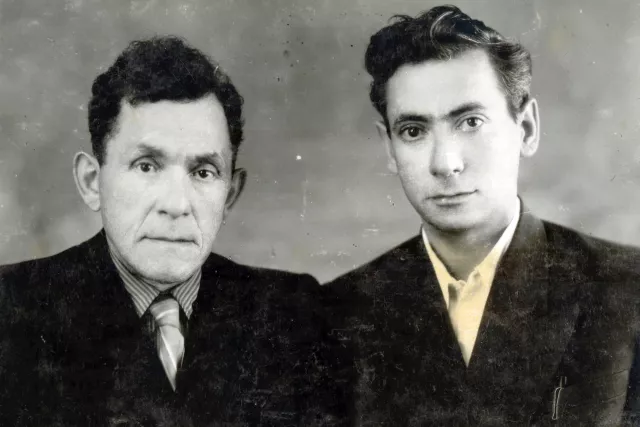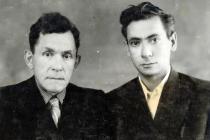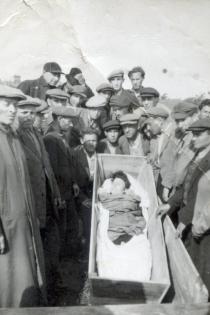This is me with my uncle Aaron Elencwajg. This photo was taken in 1940 in Babruysk, where I escaped after the war broke out.
I remember the beginning of the war in 1939. My brother and I stayed in Miedzyrzec under German rule for a few more weeks, until December. Then the Germans introduced those yellow patches that all Jews had to wear outside, and which we were to sew ourselves. It was then me and my brother and some friends decided to run. We went through the countryside to an airfield on the Bug and crossed to the other side. We arrived in Brzesc and stayed there. My brother and I got a job at a tailor's shop.
Then I heard all refugees from beyond the Bug were to be sent to Siberia. So me and my brother signed up to be sent to Minsk. We knew one of our uncles lived there, Uncle Aaron. He was one of my father's cousins; I didn't know the exact connection. Upon arrival in Minsk I went to the police station and the local registry office. And a nice girl working there told me Aaron Elencwajg did indeed live in Minsk but had been transferred to Bobrujsk, today Babruysk in Belarus. So I had a clue. My brother and I went to Bobrujsk.
In Bobrujsk we encountered a strange situation. We have arrived and we ask around in the Jewish quarter about Uncle Aaron. Everyone just walks away in silence. What's up? Then I walk through the city, cross a street, I look, there's a bristle-making shop. I recognize the tools - the bristle-maker's combs. I think it's here my uncle must be working. I enter through the courtyard, say 'zdrastvuytye, pan' [Russian: 'hello, sir'], because by then I had already learned some Russian, and I ask whether an Elencwajg works here. Everyone looks at me and says nothing, as if they are all mute. How long can I be standing like that? A minute, two - I walk out.
At that point one of the women ran after me and told me my uncle had been taken. Meaning arrested. And that back in 1937 when a campaign was launched against the Trotskyists. Because he was an avowed Trotskyist. They were all arrested and my uncle got five years of prison. I asked the woman whether my uncle had a wife, and she said he had a wife who lived in Bobrujsk.
I went to her. She lived in a single room, a cramped cubbyhole, but she found some place for us and put us there. Then she got a job for us - for me and my brother. At Ampel, a tailor cooperative, the head of which was my uncle's friend, a Russian Jew. We worked there until June 1941 when the Germans invaded Russia.
Nachman Elencwajg with his uncle Aaron Elencwajg
The Centropa Collection at USHMM
The Centropa archive has been acquired by the United States Holocaust Memorial Museum in Washington, DC.
USHMM will soon offer a Special Collections page for Centropa.
Academics please note: USHMM can provide you with original language word-for-word transcripts and high resolution photographs. All publications should be credited: "From the Centropa Collection at the United States Memorial Museum in Washington, DC". Please contact collection [at] centropa.org.













